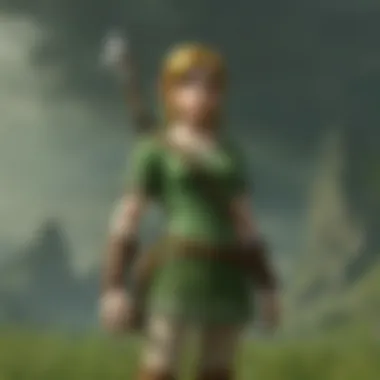Exploring The Legend of Zelda on PC: A Comprehensive Guide


Intro
The Legend of Zelda franchise stands as a hallmark in the gaming world, influencing players and creators alike over decades. This article explores how fans of the series can transcend traditional gaming platforms and experience these iconic adventures on personal computers. The underlying motivations for this shift stem from a desire for enhanced performance, accessibility, and community collaboration.
Many gamers question how the essence of The Legend of Zelda can translate to the PC environment. This article aims to dissect that question through historical context, legal implications, and an overview of community-driven modifications. By emphasizing both the advantages and drawbacks, we will navigate through a comprehensive exploration, shedding light on the player experience that often relies on emulation. We also aim to reflect on the cultural significance and evolving narratives within the franchise as they reach a broader audience.
Game Reviews
The transition from consoles to PCs presents unique opportunities to examine gameplay features and mechanics in depth. Here, we will take a closer look at the core elements that define The Legend of Zelda games, how they operate in emulated environments, and what this means for new and returning players.
Gameplay Features and Mechanics
At the heart of each Zelda title lies intricate gameplay mechanics, marrying exploration with puzzle-solving. Choices made by developers such as Nintendo often define how players engage with the world. When emulated, these mechanics must translate faithfully to preserve the essence of the experience.
- Exploration: Players traverse vast landscapes, discovering secrets and treasures.
- Puzzle-Solving: Each game introduces unique puzzles that require strategy and thought.
- Combat: Diverse enemies and bosses demand various combat techniques.
Storyline and Quests
The narrative arcs within The Legend of Zelda series are woven intricately into gameplay. Each title presents quests that intertwine player actions with unfolding stories, focusing on the eternal conflict between Link and Ganon. Emulation provides players the chance to delve into these narratives without the constraints of specific hardware, potentially allowing for a more personal experience.
Visuals and Sound Design
Art direction in Zelda games contributes significantly to their appeal. While initially crafted for consoles, the visuals can be enhanced on PC by modifying graphics settings. Furthermore, sound design plays a critical role in immersing players into the fantasy world of Hyrule.
Comparison with Previous Titles
Assessing gameplay adaptations requires views on how current titles compare to their predecessors within the series. Each entry includes innovations in mechanics or storyline, reflecting the technological and narrative progress of gaming as a whole. Community patches also aim to bridge the gaps, improving playability and graphics without compromising the original design.
“The beauty of fan emulation lies in its capacity to breathe new life into beloved titles.”
Character Analyses
As players engage with The Legend of Zelda on PC, a deeper understanding of character dynamics enhances the experience. It is crucial to analyze who these characters are within the mythical landscape of Hyrule and how they are perceived across different platforms.
Popular Characters Overview
The Legend of Zelda series features a rich roster of characters — from the courageous Link to the enigmatic Princess Zelda and the malevolent Ganon. These personalities not only populate the story but also embody its themes and challenges.
Character Development and Backstories
Each character brings a unique backstory that influences their role throughout the franchise. Understanding these narratives can provide insights into motivations and actions within the games, and engaging with community content can lead to new interpretations.
Role in the Zelda Universe
Characters like Link and Zelda are central to the series, representing the eternal battle between good and evil. Emulated versions maintain these vital interactions, encouraging players to explore their dynamics in greater detail.
Fan Theories and Speculations
As players discover new aspects of characters through emulation, they often develop theories that add layers to the established canon. Such explorations highlight how community discourse strengthens enthusiasm for the franchise.
Lore Discussions
The Legend of Zelda series is steeped in lore, creating a tapestry that invites players to engage in further exploration. The nuanced worldbuilding supports a deeper understanding among fans, especially when utilizing enhanced features on PC.
Mythology and Worldbuilding
Hyrule is not merely a backdrop but a character in its own right. Its mythology influences the series' narrative structure and interactive gameplay significantly. Enhanced emulators often allow for richer exploration of these mythic elements.
Legendary Items and Artifacts
Items like the Master Sword or the Triforce add depth to the story. They symbolize various themes and can be examined closely, with detailed information often available in enhanced emulation settings.
Link to Real-world Mythologies
Several elements in the Zelda universe draw inspiration from global myths. Understanding these connections enriches the gameplay experience, encouraging analysis of time-honored tales.
Timeline Placement and Theories


The complex timeline of The Legend of Zelda provides fertile ground for speculation. Emulators often include access to entire series compilation, allowing players to explore event placement and the broader lore puzzle.
Gameplay Strategies
As players approach the challenges within Zelda on PC, strategic thinking becomes essential. Emulation can provide detailed options and guides that amplify the gaming experience through helpful insights.
Combat Techniques and Tips
Mastering combat is vital for success. Each entry in the series introduces various combat styles and techniques. Emulators often include tips and updated strategies to aid players.
Puzzle Solutions and Walkthroughs
Navigating puzzles is a cornerstone of gameplay. Online communities often share walkthroughs to assist players while gaining insight into different solutions, enhancing engagement with the challenges.
Collectibles and Side Quest Guides
Exploring Hyrule often leads players to side quests and collectibles that significantly enrich storytelling. Guides available through community contributions can direct players toward these experiences.
Boss Battles Tactics and Strategies
Difficult encounters with bosses in each title test player skill. Utilizing resources from the community can enhance understanding of their patterns and weaknesses, leading to more effective strategies.
By carefully analyzing these elements, gamers can cultivate a deeper appreciation for The Legend of Zelda franchise, regardless of the platform they choose.
Foreword to the Legend of Zelda
The Legend of Zelda franchise holds a significant place in the gaming world, renowned for its inventive gameplay and story. This section provides a foundation for understanding why it is crucial to explore the franchise on PC. The unique features of the series often open up discussions about adaptation, accessibility, and the evolution of gaming. Analyzing its introduction sets the stage for examining the game's legacy and the impact it has had on players worldwide.
Historical Background
The origins of the Legend of Zelda can be traced back to its debut in 1986, created by Shigeru Miyamoto and Takashi Tezuka. The first game introduced players to the land of Hyrule, where they took on the role of Link, tasked with rescuing Princess Zelda from the villain Ganon. This game was ahead of its time, showcasing an expansive open-world exploration that allowed players to approach challenges in various ways. Each release in the series built upon its predecessors, contributing to a rich tapestry of lore, gameplay mechanics, and design philosophy.
The franchise has expanded through numerous sequels and spin-offs, evolving into a staple of Nintendo's offerings. Each title maintained core elements while introducing new gameplay innovations. The Legend of Zelda: Ocarina of Time is frequently highlighted for its groundbreaking use of 3D graphics and real-time combat. Over the years, it garnered critical acclaim and numerous awards, further cementing Zelda's status in gaming history.
Cultural Impact
The influence of the Legend of Zelda extends beyond just gameplay. It permeates popular culture and has garnered a diverse fan base that spans generations. The series has inspired countless adaptations, including comics, articles, and even orchestral performances. Memorable themes and characters have become iconic, contributing to a recognizable gaming identity.
Furthermore, the series has sparked discussions on narrative design and character development in interactive media. Fans often debate the significance of the timelines and story arcs, indicating a deep engagement with the material. This engagement cultivates a sense of community, where fans collaborate on theories, share creative projects, and uphold the franchise's legacy. The enduring popularity of the Legend of Zelda signifies its vital role in shaping the landscape of modern gaming.
The Need for PC Adaptation
The conversation around adapting The Legend of Zelda for the PC deserves significant attention. This topic highlights not just a technical shift but also the shifting landscape of gaming consumption. Each Zelda title has its own unique flavor, and bringing these experiences to a PC environment presents both opportunities and challenges.
Reasons Behind the Interest
Interest in playing Zelda games on PC partly stems from players seeking more flexibility in how they engage with their favorite titles. The PC gaming community thrives on customization and personalization. This allows players to tailor experiences to fit their individual preferences. Modding support is a major factor here. Users can enhance graphics, create new content, and even alter game mechanics. This adds a new layer to the classic titles that console gaming does not currently offer. Moreover, fans often seek to revisit the Zelda franchise not just for nostalgia but for the enjoyment of enhanced experiences that PCs can afford.
Another significant reason is the historical preservation of older games. Many classic Zelda titles are difficult to find or play on current consoles. Emulation helps revive these experiences for new generations who may not have access to older hardware. This preservation aspect emphasizes the importance of keeping the lore and legacy alive for those who respect gaming history.
Limitations of Console Gaming
Console gaming, while popular, comes with distinct limitations that can hinder player experience. Firstly, the availability of titles can be restricted to a specific console. Nintendo has a stronghold on its franchises, making it frustrating for fans who wish to play outside of their ecosystem. Additionally, consoles often limit access to certain game modifications. Unlike PC, where developers can allow full control over game files and features, consoles tightly control what can be changed.
Another concern involves hardware capabilities. Consoles possess fixed specifications, meaning that as technology evolves, older consoles may not adequately support new advancements in gaming. This results in outdated graphics and performance issues that can detract from gameplay. The sense of community inherent in PC gaming also contrasts with console limitations. Modding communities flourish around Zelda games, allowing for collaboration and shared creativity that console platforms typically stifle.
"The transition from console to PC for Zelda games represents a massive shift, highlighting not just accessibility but also the evolving nature of gaming communities."
In summary, the need for PC adaptation of The Legend of Zelda is bolstered by both a desire for personalized gaming experiences and the specific limitations present within console platforms. This section sets the stage for understanding the importance of such adaptation not just for technology's sake but for the long-term health of the franchise in modern gaming.
Emulation of Zelda Games on PC
Emulation serves as a vital bridge between dedicated fans of the Legend of Zelda franchise and the original titles that have, in many cases, become scarce or inaccessible. This topic garners interest because it illustrates both the devotion of the community and the intricacies involved in experiencing these celebrated games outside their intended platforms. Emulation allows enthusiasts to revisit classic Zelda adventures with modern technical enhancements and greater flexibility.
Among the notable advantages, emulation provides superior graphical fidelity and performance on capable PC hardware. Gamers can experience high-resolution graphics, enhanced textures, and improved frame rates, which amplifies the nostalgic experience. Furthermore, emulators often include customization features, permitting players to adjust settings according to their preferences, further enriching gameplay.
However, the conversation about emulation cannot be complete without addressing the critical factors related to legality and ethics. Gamers balancing their enthusiasm with the need to respect intellectual property rights face an ongoing dilemma. From understanding the boundaries of Fair Use to the significance of obtaining ROMs through legitimate means, there are various layers to consider in this ecosystem.


The following sections will delve deeper into these facets of emulation, ensuring a well-rounded view on the subject.
Technical Aspects of PC Gaming
Understanding the technical aspects of PC gaming is crucial for any serious exploration into the Legend of Zelda franchise on this platform. The capabilities of PCs far exceed those of traditional gaming consoles in several respects. Enhanced hardware allows for better graphics, smoother performance, and the ability to customize one's gaming experience in ways that consoles cannot match. This section will examine the significance of these elements and how they contribute to the overall enjoyment of Zelda games on PC.
Graphics and Performance Enhancements
One of the foremost advantages of playing Zelda on PC is the potential for improved graphics. With a powerful graphics card, players can experience sharper textures, more detailed environments, and higher frame rates.
- Increased Resolution: Many modern PCs can support resolutions beyond 1080p, allowing for a clearer and more immersive gaming experience. For instance, playing The Legend of Zelda: Breath of the Wild on a high-end PC may allow players to run the game at 4K resolution, which reveals intricate details that might be lost on standard consoles.
- Dynamic Lighting and Shadows: Enhanced graphics capabilities also bring advanced lighting effects that can significantly alter the mood and aesthetics of the game world. Shadows become more realistic, and environments appear livelier, contributing to the overall experience.
- Higher FPS (Frames Per Second): Achieving a smoother gameplay experience is critical for action games like those in the Zelda series. Many PCs can easily maintain 60 FPS or more, compared to console versions that may struggle with lower frame rates.
These graphical improvements are not merely cosmetic; they can affect gameplay mechanics and player perception. The technical capabilities of a PC can offer a fuller and richer experience, fostering a deeper connection with the game’s world.
Modding and Customization Options
The flexibility of PCs extends into modding and customization options, which can enhance or alter gameplay significantly.
- User-Created Mods: The community around Zelda games has produced numerous mods, ranging from aesthetics to gameplay tweaks. For example, mods can modify character appearances, textures, or even introduce new quests and gameplay mechanics. Players can tailor their experience based on personal preferences, ensuring no two playthroughs are exactly alike.
- Tools and Software: Various applications and tools provide the means to create and install mods seamlessly. Games like The Legend of Zelda: Ocarina of Time often benefit from community-driven projects that enhance graphics or introduce expanded content, all facilitated by PC gaming's flexibility.
- In-depth Customization: Players can configure controls, screen layouts, and even game mechanics to best fit their personal style. This level of customization can lead to a more comfortable gaming experience, especially when tackling challenging sections of a game.
Overall, the technical aspects of PC gaming deliver significant benefits for playing the Legend of Zelda franchise. Graphics and performance enhancements, combined with extensive modding options, not only enrich the gameplay experience but also foster a creative community passionate about exploring Hyrule in new and innovative ways.
"The community around Zelda games is one of the most vibrant and creative in gaming, continually pushing the boundaries of what's possible through modding and customization."
These features collectively shape how players engage with these iconic games, propelling the Zelda legacy further into the contemporary gaming landscape.
Community Contributions
The realm of Community Contributions has become a cornerstone in the discussion around The Legend of Zelda on PC. As gaming transitions toward more open platforms, players and fans take an active role in enhancing their favorite titles. This section highlights the vital aspects that embody community-driven content, emphasizing the benefits it brings to the Zelda experience.
Fan Projects and Modifications
Fan projects breathe new life into classic titles. These creative endeavours often aim to remake, remaster, or expand upon existing Zelda games. One notable example is the ongoing project called Zelda: Ocarina of Time - 3D. This fan remake utilizes modern graphics and gameplay mechanics, appealing to both old players and newcomers. Not only does this enhance the visual experience, but it also introduces a fresh perspective on the gameplay. Fans contribute in various ways:
- Custom Graphics: Enhanced textures and new character models.
- Gameplay Tweaks: Improved mechanics to modernize playability.
- New Levels or Quests: Extended content strengthens the universe.
Each modification captures the spirit of Zelda, reflecting the community’s deep appreciation and respect. However, these projects often face legal challenges, highlighting the tension between innovation and intellectual property rights.
Collaborative Efforts in Game Development
When considering collaboration, the Zelda community is nothing short of impressive. Developers often share knowledge through platforms like Reddit, where they exchange ideas and troubleshoot problems. This creates a hub for aspiring creators and seasoned developers alike. Examples of collaboration include:
- Collaborative Mods: Teams form to build expansive mods that upgrade multiple Zelda titles, assisting in design, coding, and production.
- Resource Sharing: Tools and assets are shared, allowing for greater designs with less individual effort.
- Game Jams: Events encourage rapid development of new ideas and experiences within the Zelda universe.
The strength of community contributions lies not only in creativity but also in fostering relationships among players and developers. This camaraderie can lead to innovations that resonate throughout the gaming landscape.
The fusion of diverse talents results in projects that may not have reached fruition under traditional development constraints. This community-driven approach signifies a shift toward collaborative creativity, empowering fans to redefine a beloved franchise.
Comparative Gameplay Experience
The exploration of Comparative Gameplay Experience is crucial in understanding the multifaceted nature of gameplay. This evaluation highlights how different platforms provide unique experiences, particularly the contrast between PC and console gaming. By delving into these distinctions, we can identify the specific strengths and weaknesses of each, thereby enriching the player's understanding of how context influences interaction with The Legend of Zelda.
PC vs Console: A Critical Evaluation
When we analyze gameplay on PC compared to console systems like the Nintendo Switch or PlayStation, several key factors emerge. First, let's consider performance. PC gaming often supports higher frame rates and better graphics, which can enhance the overall experience. With powerful hardware, players can achieve smoother animations and more detailed textures.
On the other hand, many consoles offer optimized performance tailored specifically to the hardware, ensuring a consistently smooth gameplay experience without compatibility issues. The broader accessibility of consoles allows for easier plug-and-play experiences, which can be appealing to casual gamers.
Another critical factor is controls. With a PC, players can choose their preferred input device, whether it’s keyboard and mouse or game controllers. This flexibility can lead to more precise control schemes, especially in action-heavy segments of Zelda games. However, gamepads on consoles often feature integrated haptic feedback and other ergonomic designs which enhance immersion.
In terms of game libraries, PC offers a wider variety of games, often including mods and extra content not found in console versions. However, consoles tend to have exclusive titles and experiences that cannot be replicated elsewhere.
Overall, the preference between PC and console comes down to personal choice and play style. While the precision and customization of a PC might appeal to some, others might prefer the streamlined accessibility of consoles.
User Interface Differences
User interface (UI) significantly shapes how players interact with Zelda. On PC, the UI can be more customizable. Players have the ability to modify the interface through settings or mods, allowing them to create a layout that suits their play style. This accessibility can enhance navigation and overall interaction.


In contrast, console UIs are designed for consistency and ease of use. All players experience the same interface, which can lead to a more unified experience across the community. Consoles may simplify complex mechanics, making it easier for new players to engage with the game.
It's also noteworthy that the screen size and resolution capabilities can also influence how the UI is perceived. PCs are typically paired with larger monitors, which can make detailed elements easier to read and navigate compared to the smaller screens in handheld consoles.
The differences in UI reflect the broader philosophies behind PC and console gaming, which aim to cater to different audiences and gaming experiences.
"The choice between PC and console gameplay often reflects deeper preferences in player behavior and desired gaming experiences."
In summary, the comparative analysis of gameplay between these two platforms sheds light on the broader implications for player engagement and satisfaction in experiencing The Legend of Zelda franchise.
Narrative and Lore in PC Versions
The Narrative and Lore in PC Versions of the Legend of Zelda franchise opens avenues for exploration beyond traditional boundaries set by consoles. To fans and players, the richness of Zelda's lore provides depth and context, transcending the game mechanics. Through modifications, custom scripts, and fan-made content, players on PC can experience narratives in innovative ways. This subsection serves as a cornerstone to understand how the core essence of Zelda transforms and adapts in a PC setting.
Exploring Game Lore Through Mods
The exploration of game lore through mods presents a unique canvas for expanding the Zelda universe. Various mods delve into the backstories of characters, creating a richer narrative tapestry. Players often find mods that add new quests, refine dialogue, or even introduce entirely new characters that engage directly with classic narratives.
For example, mods like "Zelda: Ocarina of Time - Randomizer" not only allow players to re-experience the game but also weave in elements of surprise and challenge to the lore. Players immerse themselves in gameplay with vastly different outcomes, thereby enhancing their understanding of the original story.
Some notable elements of these mods include:
- Expanded Character Arcs: Mods may flesh out minor characters who have little impact in the original games, thus enriching the world.
- Alternative Story Paths: Players can explore multiple storylines based on their choices, creating a “choose your adventure” feel.
- Integration of Fan Theories: Certain mods incorporate popular fan theories into canon, strengthening community engagement.
"Mods allow creativity to flourish, letting fans reinterpret and reshape Zelda's world as they see fit."
Narrative Changes in Fan Remakes
Fan remakes of Zelda games come with their own set of narrative changes that can both honor and reinterpret the source material. These adaptations often attempt to modernize aspects of storytelling while keeping the essence alive. The Legend of Zelda: Link's Awakening for instance, has inspired various fan remakes that retain the core gameplay but alter how the story is told.
The narrative changes can include:
- Modern Dialogue and Themes: Adjusting the dialogue to resonate with contemporary audiences while retaining contextual relevance to the original tale.
- Visual Enhancements: Updating graphics that influence the emotional tone of scenes, thus altering how the narrative feels.
- Cultural References: Integrating modern references to make the story relatable without stripping its original charm.
These remakes often serve to breathe new life into well-known stories. Such transformations prompt discussions about fidelity to the source material and the potential for innovation in storytelling in video games. As a result, players can experience beloved narratives anew, fostering a deeper connection to the characters and themes.
Future of Zelda on PC
The future of the Legend of Zelda franchise on PC holds significant importance in both the gaming community and the evolution of gaming platforms. As technology evolves, the demand for accessible versions of classic games increases. This topic offers insight into the potential transformations within the gaming landscape, especially in relation to popular franchises like Zelda. Understanding this future trajectory can enlighten both players and developers about the new opportunities or challenges that may arise.
One significant aspect is the possibility of official releases by Nintendo. While currently, the franchise is predominantly associated with Nintendo consoles, shifting trends indicate that it may be prudent for the company to consider releases on PC. This approach could capture a broader audience, tapping into the growing population of PC gamers who yearn for iconic titles like Zelda.
Considerations about the trends in gaming platforms also play a vital role. The rise of digital distribution, along with cloud gaming, allows players to have more flexibility in how and where they experience games. This evolution suggests that franchises popular in console formats could find new life on PC, creating a healthy dialogue between traditional and modern gaming.
"The gaming platform landscape is ever-changing. Developers need to stay ahead of the curve to satisfy the expectations of their audience."
Potential Official Releases
The idea of potential official releases of Legend of Zelda games on PC presents multiple layers of considerations. Firstly, there is a clear economic incentive for Nintendo. By releasing their games on PC, they can revitalize interest in older titles and introduce the franchise to new players. Such action could lead to increased sales and a welcoming environment for their products across diverse platforms.
Moreover, PC adaptations could include enhanced graphics and performance capabilities, catering to modern computers. Players often appreciate higher frame rates and better resolutions. These enhancements could make experiences richer, especially for a visually appealing franchise like Zelda.
However, there exist concerns about the impact on Nintendo's console sales. By releasing popular franchises on PC, the company may inadvertently reduce the incentive for users to purchase their consoles. Balancing this with the demand from the gaming community poses a unique strategic challenge.
Trends in Gaming Platforms
The gaming industry continues to evolve rapidly, and current trends indicate a shift towards more diverse and accessible platforms. The rise of digital marketplaces such as Steam is reshaping how players discover and purchase games. This marketplace provides an opportunity for titles that were once relegated to consoles to gain new audiences.
Furthermore, cloud gaming services, such as NVIDIA GeForce NOW or Google Stadia, are emerging as significant players. These services allow users to play high-quality games without the need for powerful hardware, which is particularly beneficial for games that demand high performance like those in the Zelda series.
Another noteworthy trend is the increasing popularity of indie game development. The success of fan projects and mods could inspire Nintendo to explore collaborative opportunities, creating a synergy between official game releases and community-driven content. Such partnerships may bridge the gap between traditional gaming and modern reinterpretations.
Culmination: Synthesis and Reflection
The examination of the Legend of Zelda franchise within the context of PC gaming provides a remarkable lens through which we can understand the intricate dynamics of innovation in gaming. In this article, we have explored historical foundations, community engagements, and the ongoing debates over platforms, all while considering the core appeal of Zelda as an enduring cultural icon.
The Place of Zelda in Gaming Culture
The Legend of Zelda is more than just a game; it is a pillar of gaming culture. Since its inception in 1986, it has not only revolutionized game design and storytelling but also created a dedicated community. Link, the protagonist, embodies the archetype of the hero's journey, and players have formed deep connections with him. The themes of adventure, courage, and exploration resonate across generations.
Zelda's influence extends beyond its gameplay, impacting various facets of gaming culture. Fan art, music covers, and speedrunning are just a few examples of how the community has engaged with the series. Events like the Zelda-thon showcase the passion of fans aiming to raise money for charity, displaying the franchise's broader cultural significance.
The Ongoing Debate: Is PC the Future?
The discussion regarding the future of Zelda on PC is indicative of larger trends in the gaming industry. As technology advances, preferences in gaming platforms shift. Many gamers advocate for the superior performance and customization options available on PC versus traditional consoles. Emulation and modding communities continue to thrive, demonstrating a desire for greater accessibility to Zelda titles.







